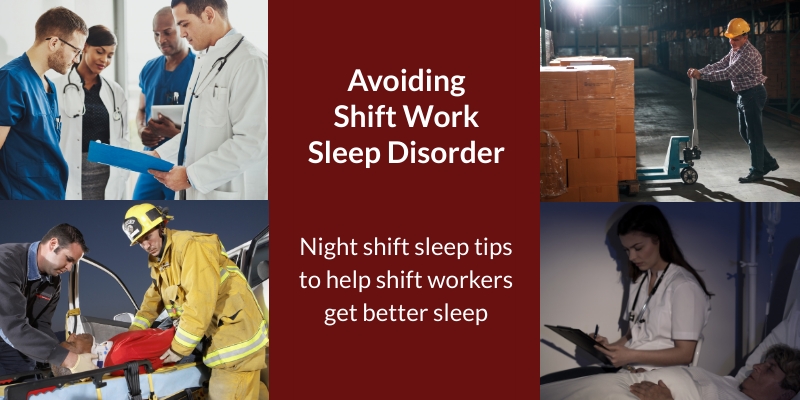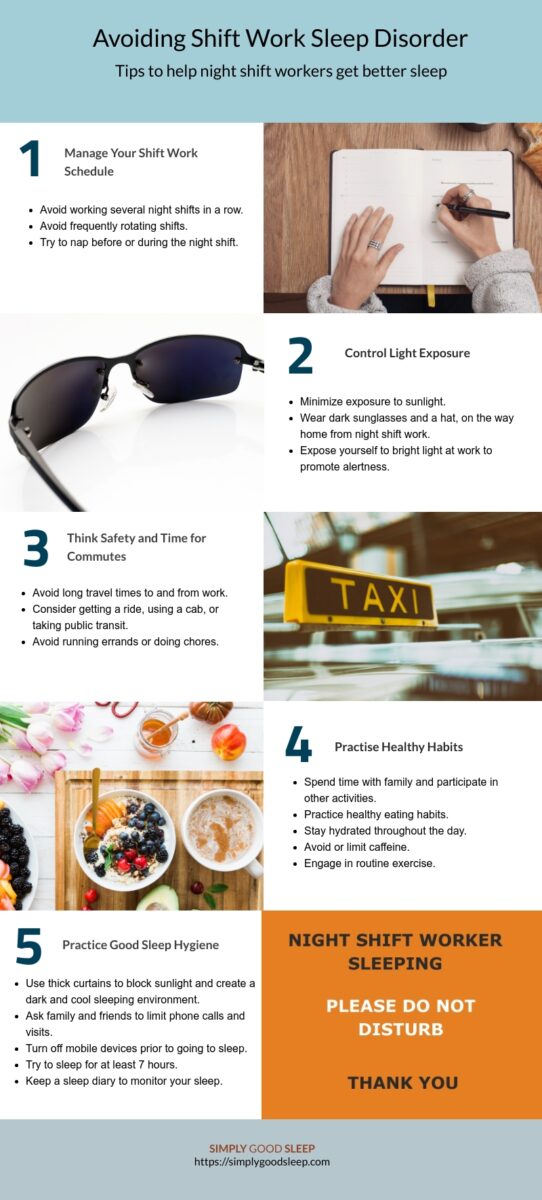
If you are a shift worker and work the night shifts or often rotate shifts, you may be at risk of shift work sleep disorder. You need to pay close attention to your sleep. Here, we provide night shift sleep tips to help you get better sleep.
What is Shift Work Sleep Disorder?
In order for the human body to feel rested, we need to have a dedicated sleep schedule. However, once you work the night shift, you are going against the body’s natural desire to be asleep at night time and to be awake during the daytime.
You will experience something called the shift work sleep disorder. In shift work sleep disorder, your internal body clock or circadian rhythm experiences difficulty adjusting to a different sleep/wake schedule, resulting in difficulties falling asleep and remaining asleep when desired.
Shift work sleep disorder may occur in night shift workers, including nurses, doctors, paramedics, police officers, firefighters, warehouse workers, security staff, truck drivers, and cleaning staff.
Most shift workers sleep 1 to 4 hours less than non-shift workers. It is important to get at least 7 hours of sleep each day.
If you work the night shift, pay close attention to your sleep needs.
Shift Work Sleep Disorder symptoms
Usually when you have the Shift Work Sleep Disorder, you will feel sleepy all the time, especially when you need to be productive, alert and awake during night work.
You may also experience insomnia, in particular, difficulty falling asleep and staying asleep when you try to sleep during the daytime. Your body needs to sleep, but you can’t sleep at all.
You may have a lack of energy, headaches, irritability, poor memory, difficulty with concentration, slow reaction time, and indigestion.
In addition, you may experience something called microsleep. In microsleep, you fall asleep just for a few seconds, and while it might offer a bit of rest, it is also very dangerous because you may be working, driving, or operating heavy machinery.
Microsleep can lead to dangerous situations, such as injuries, work-related errors, or accidents.
Is Shift Work Sleep Disorder dangerous?
Not sleeping enough over time, may make you more prone to danger, injuries, accidents, and errors. Your sleep, alertness, body temperatures, hormone levels and even hunger levels will be affected by this disorder, possibly putting you at risk of health-related issues, such as heart disease, metabolic problems, and depression.
What can you do to get much needed sleep and eliminate Shift Work Sleep Disorder from your life?
There are some simple ways to help you get good sleep. Usually it comes down to practising good sleep hygiene and following some tips like the ones below:
Practice Good Sleep Hygiene
- Make sleep a priority. Follow good sleep hygiene and try to sleep for at least 7 hours. .
- Create a dark and cool sleeping environment when you sleep during the day by using thick curtains to block sunlight. Wear earplugs and use white noise to drown out noise.
- Ask family and friends to limit phone calls and visits. Place a “Do Not Disturb” sign on the front door so that visitors and friends will not knock or ring the doorbell.
- Turn off mobile devices prior to going to sleep.
- Start and keep a sleep diary to monitor your sleep habits and sleep pattern over time.
Control Light Exposure
- Minimize exposure to sunlight, for example, by wearing dark wrap-around sunglasses and a hat, on the way home from night shift work to make it easier for you to fall asleep once you arrive home.
- Expose yourself to bright light at work to promote alertness during the night shift.
Manage Your Shift Work Schedule
- Try not to work a number of night shifts in a row. Limit night shifts and schedule days off in between to prevent sleep deprivation.
- Avoid frequently rotating shifts. Seek, if possible, a schedule that rotates from day shift to evening to night.
- After a string of night shifts, take more than 48 hours off, if possible.
- Avoid working extended hours, prolonged shifts, and excessive overtime. Make sure you have time to get adequate good sleep to recover between shifts.
- Try to nap before or during the night shift to help improve your alertness.
Practise Healthy Habits
- Spend time with family and participate in other activities.
- Practice healthy eating habits. Eat light healthy meals and snacks. As tempting as it may be, avoid high-fat, high sugar, fried, or spicy foods.
- Keep hydrated. Drink plenty of water throughout the day. Limit drinking caffeine to the beginning of your shift to help promote alertness. Don’t consume caffeine later in the shift or you may be alert and have trouble falling asleep when you get home.
- Get enough sleep on days you are not working. Try not to be sleep-deprived when beginning a night shift.
- Get daily exercise. Exercise on a routine basis can help you maintain your weight and promote bowel regularity.
Think Safety and Time for Commutes
- Try to avoid long travel times to and from work that take time away from sleeping. To prevent drowsy driving, consider getting a ride, or using a cab or public transit.
- Avoid running errands or doing chores.

After following most or all of the sleep tips above, if you still experience difficulty getting good sleep, experience symptoms that prevent you from getting enough good sleep, or experience other symptoms that concerns you or affect your day-to-day personal or work life, talk to your doctor for assessment and to get the help you need for better sleep.


8 Responses
Thank you for your tips in managing sleep with shift work. Is 5 hours of sleep enough for night shift?
Hi Jaspreet, thank you for your question. It is advised that adults aim for 7 to 9 hours of restful and quality sleep every night to maintain good health. Even for night shift workers, meeting this recommended sleep duration is essential to promote overall well-being.
Great tips! I have my good sleep hygiene, I take a warm shower and jot down in my journal stresses from my day. Doing these things help me unwind and tells my body that it’s time to sleep.
Thank you for sharing your sleep tips! You seem to have a good pre-bed routine that works for you in getting good restful sleep!
When I was younger I thought you could just get sleep back. If you’d sleep 5 hours tonight then tomorrow night you can just sleep 9 or 10 and you’re good to go. I was wrong. Sleep debt remains and you can’t catch up. It’s best to sleep well and enough regularly.
Adopting good sleep habits and, as much as possible, maintaining a consistently regular sleep-wake schedule every day, help maintain the timing of the body’s internal clock and can help you go to asleep and wake up more easily, increase the amount of sleep you get each night, and improve the quality of your sleep.
That’s a great tip to wear sunglasses on the way home from your night shift. My friend works at a pharmacy all night and gets off work around 8 or 9am, I will have to pass this along to her.
For safety reasons, your friend, who has worked the night shift, should consider getting a ride home or using a cab. She could wear dark wrap-around sunglasses on the way home from night shift work to make it easier for her to fall asleep once she gets home.
If your friend drives home from a night shift, your friend should perhaps consider not wearing dark sunglasses to avoid the risk of falling asleep behind the wheel.